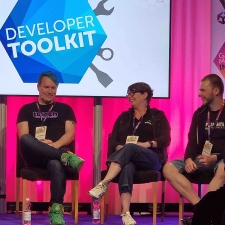In our panel named “Collaborative creativity: finding the perfect co-development partner” the subject of working getting the best out of collaborations was tackled head on by CEO of Dreamloop Games Joni Lappalainen [left in our picture], VO publisher and developer relations, EMEA at Pingle, Katleen Evers [middle] and CEO and co-founder at Zaibatsu, Jussi Ultima [right], with Steel Media’s very own COO Dave Bradley moderating the panel.
So what is co-development? “It is sometimes a buzzword people use but it's all about creating in a collaborative effort, having a common goal as we share the budget and revenue” explained Ultima.
When asked why studios may seek out a co-development partner Lappalainen took the reins. “Well the other option would be to hire someone, but there are risks. It can be a long process and it may not work out. Whereas with co-development you can find someone who is already a perfect match for you within weeks. It’s a great way to bring in processes that are relevant to you”
Evers agreed with the statement, expanding on it by saying “The gaming industry is changing and currently going through alot, so I agree it's hard to find people and hire, especially with seniors. There are risks but with co-development they are a relevant fit and you gain a tailored partnership package”
Ultima also agreed and noted that “For us we don’t do marketing or UA so we partner up for that. We discuss this with them and then we get to also take their learnings into account, they’re the experts in their field and we are the experts in ours.”
What are the pitfalls?
While co-development has its advantages, such as being able to find partners that are already experienced and experts in a specific team where your own may be less skilled, there are some challenges too.
These vary from working in different time zones to understanding different cultures. Evers commented on this saying “There are several pitfalls and time zones can be a complicated problem, but you manage it, for example if i have questions I’ll send them over and ask that I have a response the following morning, you just have to understand their limits. I do also think that it's important that teams try to meet at least once in person or do a workshop, this can be very beneficial for development and the rest of the life of the game.”
Both Ultima and Lappalainen agreed with Ultima commenting that “It's about building trust before production and maintaining it.” Lappalainen added that “Symmetry is the key, it is important in the early parts of the project that both sides make an effort to tell their processes and their culture. it saves everyone from any surprises later”.
As for other pitfalls the panel touched on the security risks of co-development as it can be daunting to invite another party into something you are creating so it's important to put certain measures in place. This can vary from having limited access to code in the early days to guarantee the security of a project or having NDAs in place, studios can have a legal team involved to take care of these matters.
As with any project there is always the potential for conflict or variations on vision, the panel discussed how teams can deal with these conflicts where Lappalainen noted that “There has to be someone on both sides taking accountability of the vision.”
Evers expanded on this saying “There definitely needs to be a captain steering the ship. We have seen conflicts in development but again this is where transparency comes in and ensuring that everyone is held accountable.”
Ultima also agreed with these statements, sharing that “It’s important to have roles and each person knows what they are responsible for, and it's often good to have one point of contact so you always know who to go to with changes or updates, it’s important to just make these things clear.”





















